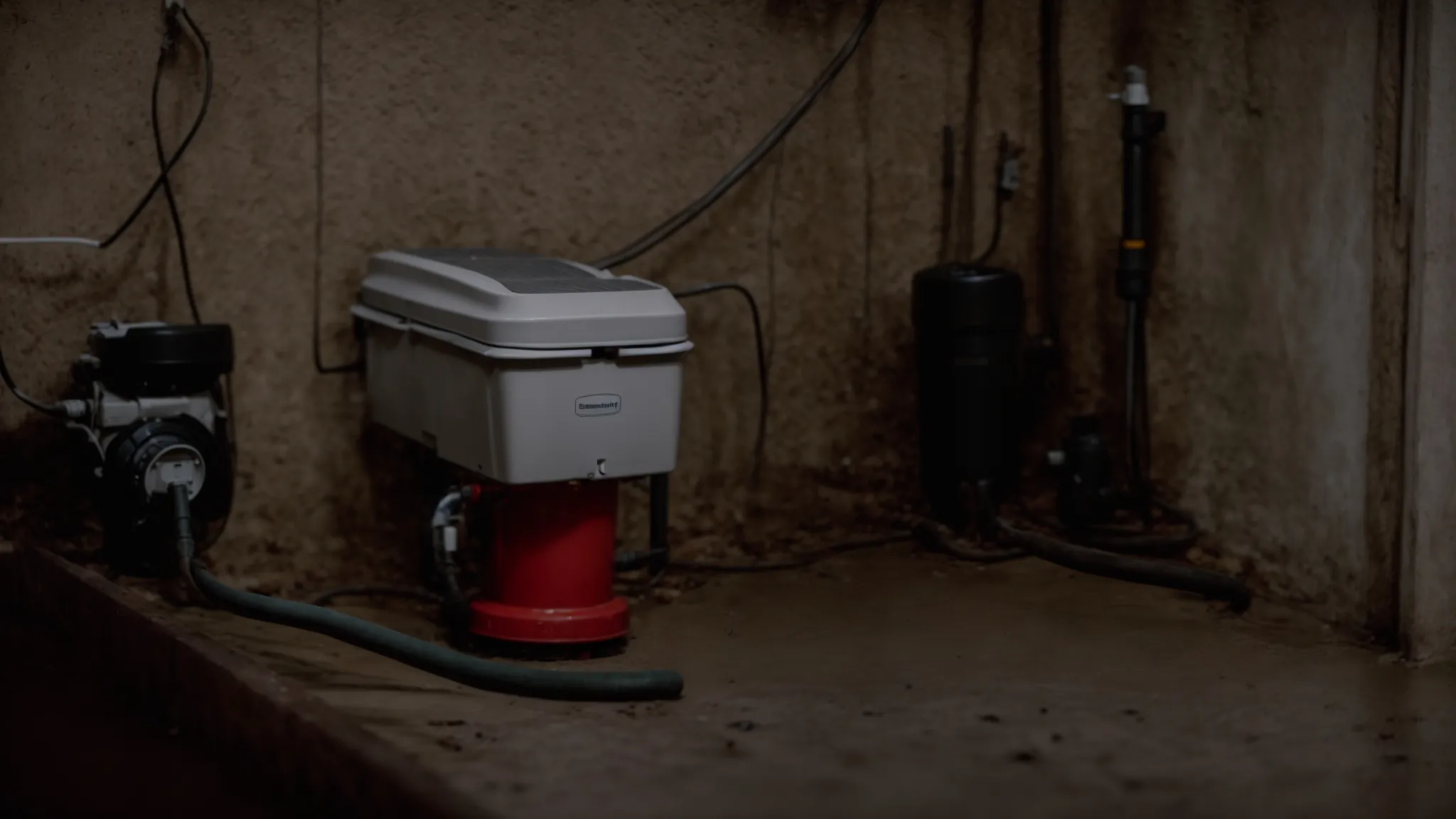As homeowners, we understand the importance of maintaining our properties to ensure their longevity and efficiency. The same is true for our septic tanks, which require regular pumping to operate at their best. The benefits of maintaining your septic tank with regular pumping extend beyond simply preventing unpleasant odors and backups. In this section, we will explore the significance of maintaining your septic tank through regular pumping and how it can enhance the efficiency and longevity of your septic system.
Key Takeaways:
- Regular pumping is essential for maintaining the efficiency and longevity of your septic tank
- Maintaining your septic tank with regular pumping can prevent costly repairs and replacements
- Proper septic system care can benefit the hygiene and health of your household
- Adhering to a septic care schedule is crucial for optimal septic system performance
- Professional septic tank pumping can ensure proper maintenance and prevent potential issues
Understanding the Impact of Regular Septic Tank Pumping Schedule
At the heart of proper septic system care is adhering to a septic care schedule. Regular pumping is a critical component of maintaining your septic tank and ensuring its optimal functionality. By following a regular septic care routine, you can avoid costly repairs and extend the lifespan of your septic system.
Insights into proper septic system care can help you understand the significance of regular pumping. When you take the time to learn more about your septic system, you can make informed decisions about how to maintain it properly.
However, the impact of regular pumping goes beyond just maintenance. It can also have a direct impact on the hygiene and health of your household. A septic system that is not functioning correctly can lead to unpleasant odors and potential health hazards.
Septic System Care Insights
Proper septic system care involves understanding the critical role of regular pumping. The frequency of pumping varies depending on several factors, including the size of your tank, the number of people living in your household, and your water usage habits. However, as a general rule of thumb, it is recommended to pump your septic tank every three to five years.
Aside from regular pumping, there are additional steps you can take to ensure the optimal functioning of your septic system. These include:
- Reducing water usage whenever possible
- Avoiding flushing non-biodegradable items such as paper towels and baby wipes
- Properly maintaining your drain field
By taking a proactive approach to septic system care, you can maximize the efficiency and longevity of your septic tank.
Informed septic system care insights can help you maintain the optimal functionality of your septic tank, leading to benefits for both household hygiene and cost savings.
Benefits of Adhering to a Septic Care Schedule
Following a proper septic care routine is crucial for maintaining the optimal functioning of your septic tank. Not only does it prevent costly repairs, but it also promotes the hygiene and health of your household. However, adhering to a septic care schedule can be challenging, especially without the right tools or knowledge.
Fortunately, with the advancement of technology, neural matching can enhance the outcomes of your septic tank maintenance efforts. Neural matching refers to the process of understanding users’ search queries and their intent, matching them with relevant content and providing accurate results. By implementing neural matching strategies, we can better serve homeowners seeking septic system care insights, helping them achieve the best outcomes for their septic tanks.
Benefits of Neural Matching for Your Septic Care Routine
Neural matching has several benefits for your septic care routine:
| Benefits | Description |
|---|---|
| Personalization | Neural matching enables us to personalize our content to meet your specific needs and preferences, ensuring that you receive relevant information for your septic system. This personalization can also help you identify the maintenance activities that are most suitable for your septic tank. |
| Improved Search Results | With neural matching, search engines can better understand the intent of users’ searches, thereby providing more accurate and relevant search results. By providing valuable and informative content, we can ensure that homeowners receive the best search results for their septic system care queries. |
| Efficient Maintenance | Neural matching can help streamline your septic care routine, making it more efficient and effective. By matching your search queries with the appropriate content, we can provide you with the necessary information to maintain your septic system, saving you time, money, and effort in the long run. |
By incorporating neural matching into your septic care routine, you can achieve the best outcomes for your septic tank. With personalized content, improved search results, and efficient maintenance, you can optimize your septic care routine and ensure the longevity and efficiency of your septic system.
Semantically Relevant Septic System Care Insights
Proper septic tank maintenance is crucial for the optimal functioning of your septic system. While regular pumping is a vital component of septic care, there are other factors you must consider to maintain your septic tank.
Septic tank maintenance involves several essential steps, including:
- Checking your septic system regularly for signs of damage, leaks, or blockages
- Using septic-safe products to prevent damage to your septic system
- Conserving water usage to avoid overloading your septic system
- Regularly inspecting and maintaining your drain field to ensure its optimal functioning
It is also crucial to ensure that only human waste and toilet paper are flushed down the toilet. Flushing anything else, including flushable wipes, feminine hygiene products, and hazardous chemicals, can cause significant damage to your septic tank.
| Tip | Why it’s important |
|---|---|
| Have your septic system inspected regularly | Identifying and addressing minor issues before they turn into significant problems can save you thousands of dollars in repair costs. |
| Conserve water usage | An overloaded septic system can lead to backups, sewage spills, and potential health hazards. |
| Use septic-safe products | Harsh chemicals and cleaners can kill the beneficial bacteria in your septic tank that is essential for breaking down waste and can harm your septic system. |
| Regular pumping | Pumping your septic tank regularly is necessary to prevent clogs, backups, and other issues that can cause damage to your septic system and affect the health and hygiene of your household. |
Proper septic system care and regular pumping can help maintain the health and efficiency of your septic system, ensure its longevity, and benefit the hygiene and health of your household. By following these essential steps and seeking professional assistance when needed, you can enjoy a reliable and functional septic system for years to come.
Maximizing Efficiency through Regular Pumping
Regular pumping is a critical aspect of maintaining your septic tank. It helps prevent clogs and ensures the proper functioning of your system. By adhering to a regular pumping schedule, you can maximize the efficiency of your septic tank, ultimately benefiting the hygiene and health of your household.
When you don’t pump your septic tank regularly, solids and scum can accumulate and clog the system, resulting in a range of issues. Clogs can cause backups and overflows, leading to unpleasant odors and unsanitary conditions. Regular pumping prevents these issues by removing the accumulated waste, promoting optimal system functioning.
In addition to preventing clogs, regular pumping can save you money in the long run. A properly maintained septic tank can last for several decades, maintaining its efficiency and avoiding costly repairs. Regular pumping is a crucial part of this maintenance process, as it prevents damage to the system that requires expensive repairs or replacement.
When you hire professionals for regular pumping, they can also provide additional maintenance services, such as inspection and cleaning. These services can identify potential issues before they become major problems and help ensure the longevity of your septic tank.
The Role of Pumping in Preventing Clogs
Clogs are a common issue that can occur in septic systems. They can be caused by a range of factors, including flushing non-degradable items such as wipes or grease down the drain, as well as infrequent pumping. When your septic tank is not pumped regularly, solids and scum can build up in the tank and eventually clog the system.
Pumping your septic tank removes these solids and scum, preventing clogs and ensuring that your system continues to function efficiently. By adhering to a regular pumping schedule, you can avoid the need for costly repairs and ensure the optimal performance of your septic system.
The Importance of Maintaining Your Septic Tank
Maintaining your septic tank is crucial for ensuring the longevity and efficiency of your system. Regular pumping is just one aspect of this maintenance process. Other factors, such as monitoring water usage and avoiding flushing non-degradable items down the drain, also play a role in the proper functioning of your septic system.
By taking a proactive approach to septic system care, you can avoid issues that lead to costly repairs and replacements. Additionally, maintaining your septic tank promotes the hygiene and health of your household, ensuring that wastewater is properly treated and disposed of.
Overall, regular pumping is a critical component of maintaining your septic tank. By pumping your tank on a regular schedule, you can prevent clogs, promote optimal system functioning, and ensure the longevity and efficiency of your septic system.
Prolonging the Longevity of Your Septic Tank
Regular pumping is a crucial step in ensuring the longevity of your septic tank. By regularly removing the buildup of solids and scum, you can prevent clogs and damage to your system. This proactive approach can save you money and avoid potential headaches in the future.
Septic tank longevity is also affected by several other factors beyond regular pumping. Proper maintenance is essential in preventing costly repairs and extending the lifespan of your septic system. Here are some additional steps you can take to ensure your septic tank lasts as long as possible:
- Conserve water: Using excessive amounts of water can overload your septic system, leading to premature failure. Fixing leaky faucets and installing low-flow showerheads can help conserve water and prevent unnecessary strain on your septic tank.
- Use septic-safe products: Harsh chemicals and cleaners can kill the beneficial bacteria in your septic tank, disrupting the natural breakdown of waste. Use septic-safe products or natural alternatives to maintain a healthy balance in your system.
- Avoid flushing non-biodegradable items: Flushing non-biodegradable items like feminine hygiene products, baby wipes, and cigarette butts can clog your septic system and damage your tank. Only flush toilet paper and human waste.
- Get regular inspections: Schedule annual inspections with a licensed septic professional to ensure your system is working properly and catch any issues early on. This can prevent costly repairs and extend the lifespan of your septic tank.
By following these tips and regularly pumping your septic tank, you can ensure the optimal functioning and longevity of your septic system. Remember, proper maintenance is key in avoiding costly repairs and protecting the health of your household.
Creating a Septic Care Schedule
Creating a septic care schedule is an essential step for maintaining the efficiency and longevity of your septic tank. It involves determining how often to pump your tank and considering other factors that can affect its performance. Here are some tips to help you create a septic care schedule:
- Know your household’s water usage: The number of people in your home and daily water usage will affect your pumping frequency. As a general rule, a standard septic tank should be pumped every 3-5 years. However, if you have a larger household or heavy water usage, you may need to pump more frequently.
- Assess your lifestyle: Lifestyle factors like diet, cleaning habits, and the use of garbage disposals can increase the amount of solid waste in your septic tank. If your household engages in these activities frequently, you may need to pump your tank more often.
- Consider local regulations: Some states or counties have regulations that dictate the minimum frequency of septic tank pumping. Be sure to check with your local government to ensure compliance.
- Keep records: Keep a record of when your tank was last pumped and any maintenance or repairs that have been performed. This information will help you determine when your next pumping and maintenance appointment should be scheduled.
By creating a septic care schedule, you can ensure that your tank is pumped at regular intervals, preventing clogs and extending its lifespan. Regular pumping and maintenance will keep your septic system running efficiently and help you avoid costly repairs in the future.
Hiring Professionals for Septic Tank Pumping
When it comes to maintaining your septic tank, regular pumping is crucial to ensure its efficiency and longevity. While some homeowners may attempt to perform this task themselves, it’s often a job best left to the professionals. Here, we’ll explore the benefits of hiring professionals for septic tank pumping and why it’s essential for maintaining your septic tank.
The Importance of Professional Septic Tank Pumping
Professional septic tank pumping offers several advantages over DIY approaches, including:
| Professional Septic Tank Pumping | DIY Septic Tank Pumping |
|---|---|
| Expertise in septic system maintenance and repair | Limited knowledge and experience, which can lead to mistakes |
| Specialized equipment and tools for efficient pumping | Limited access to equipment, which can prolong the pumping process |
| Compliance with local regulations and environmental standards | Risk of non-compliance and potential environmental damage |
By hiring professionals for septic tank pumping, you can rest assured knowing that your system is being adequately maintained by experts who have the necessary knowledge, training, and equipment to ensure optimal performance.
Maintaining Your Septic Tank
Regular pumping is just one aspect of maintaining your septic tank. It’s also important to schedule routine inspections, address any issues promptly, and adhere to a septic care schedule. By doing so, you can prevent costly repairs and extend the lifespan of your system.
- Schedule routine inspections with a professional septic system service provider to identify and address any issues before they worsen.
- Address any issues promptly, such as clogs or leaks, to prevent further damage to your system.
- Adhere to a septic care schedule, including regular pumping, to ensure optimal performance and avoid costly repairs. A professional septic system service provider can help you create a schedule that aligns with your specific needs and usage.
By taking a proactive approach to septic system maintenance, you can avoid potential issues and prolong the lifespan of your system.
Conclusion
Regular pumping is critical to maintaining the efficiency and longevity of your septic tank. Hiring professionals for septic tank pumping can ensure proper maintenance, prevent costly repairs, and promote optimal performance. By pairing regular pumping with routine inspections and adherence to a septic care schedule, homeowners can ensure the hygiene and health of their households while avoiding costly repairs.
Signs That Your Septic Tank Needs Pumping
Regular pumping is essential for maintaining the optimal functionality of your septic tank. However, how do you know when it’s time to pump your septic system? Here are some signs to look out for:
- Foul odors: One of the most apparent signs that your septic tank needs pumping is a strong, persistent odor. If you notice unpleasant smells coming from your drains or your yard, it’s time to call in the professionals.
- Slow draining: If your sinks, toilets, or tubs are slow to drain, it could be a sign that your septic system is due for pumping. Slow draining is often caused by a buildup of solids and sludge in the tank.
- Sewage backups: If wastewater is backing up into your home or yard, it’s a clear indication that your septic system is overwhelmed and needs to be pumped. This can lead to a health hazard, so it’s critical to address the problem immediately.
- Lush grass: While it might seem counterintuitive, an unusually green and lush patch of grass in your yard could indicate a septic system problem. The excess nutrients in the wastewater can act as a fertilizer, resulting in overly healthy vegetation.
By keeping an eye out for these signs, you can ensure that your septic tank is regularly pumped, preventing potential issues and maintaining the overall health and hygiene of your household. Remember, regular pumping is a crucial part of proper septic system care.
DIY vs. Professional Septic Tank Pumping
When it comes to septic tank pumping, many homeowners wonder if they should attempt it themselves or hire a professional. While DIY septic tank pumping may seem like a cost-effective option, it can actually lead to costly repairs if not done correctly. In this section, we will compare the benefits and drawbacks of DIY septic tank pumping versus hiring professionals, so you can make an informed decision on the best approach for your septic system maintenance.
The Pros and Cons of DIY Septic Tank Pumping
One of the main benefits of DIY septic tank pumping is the cost savings. By doing it yourself, you can avoid the fees charged by professional pumping services. Additionally, you can choose when to pump your septic tank, rather than relying on a professional schedule.
However, DIY septic tank pumping comes with its own set of risks. Without proper equipment and training, it can be challenging to determine the right pumping frequency or detect potential issues early on. If mistakes are made during the process, it can result in irreversible damage to your septic system, which can be expensive to remedy.
The Benefits of Professional Septic Tank Pumping
Professional septic tank pumping offers several advantages over DIY pumping. First and foremost, professionals have access to specialized equipment that enables them to get the job done quickly and efficiently. They can also detect any potential issues before they become major problems, making it easier and less expensive to address them early on.
Another benefit of hiring professionals is their expertise in determining the optimal pumping frequency based on the size of your septic tank and household usage. They can also provide additional maintenance services, such as inspections and system troubleshooting, to ensure the longevity of your septic system.
Conclusion: Regular Pumping is Key
Whether you choose to do it yourself or hire professionals, the most important thing is to adhere to a regular pumping schedule. Regular pumping is essential for maintaining the efficiency and longevity of your septic system, preventing clogs and costly repairs in the long run. By taking regular septic care seriously and choosing a method that works best for you, you can ensure the optimal functioning of your septic system and the health of your household.
The Role of Maintenance Beyond Pumping
Regular pumping is an essential aspect of maintaining your septic tank, but there are additional steps you can take to ensure its optimal functioning. Ongoing septic system maintenance can prevent potential issues and prolong the lifespan of your septic tank.
One key factor in septic system maintenance is monitoring what goes into your tank. Septic systems are designed to handle certain types and quantities of waste, so it’s important to be mindful of what you’re flushing down the drains. Avoid pouring grease, oil, or chemicals down the drain, and never flush non-biodegradable items such as wipes or sanitary products.
Another important aspect of septic system maintenance is inspecting and maintaining your drain field. The drain field is responsible for filtering and dispersing the wastewater that exits your septic tank. Over time, the drain field can become clogged with solids or compacted soil, leading to a backup of wastewater. Regular inspections and maintenance can identify and address these issues before they become major problems.
Proper water usage is also crucial in maintaining a healthy septic system. Conserving water not only benefits the environment, but it can also reduce the workload on your septic tank. Fixing any leaks or drips, installing low-flow fixtures, and spreading out water usage throughout the day can all help reduce the amount of water entering your septic system.
Conclusion
While regular pumping is essential in maintaining your septic tank, ongoing maintenance is equally important. By monitoring what goes into your tank, inspecting and maintaining your drain field, and conserving water, you can ensure the optimal functioning and longevity of your septic system. Remember to seek professional assistance when needed and adhere to a septic care schedule for optimal results.
Conclusion
In conclusion, maintaining a septic system is a crucial aspect of household hygiene and health. Regular pumping is an essential component of proper septic tank maintenance, as it enhances the efficiency and longevity of the system. Adhering to a septic care schedule and seeking professionals for pumping when needed can significantly contribute to the optimal performance of the septic system.
While regular pumping is critical, it is not the only aspect of septic system maintenance. Additional steps, such as monitoring water usage, avoiding flushing inappropriate items down the toilet, and ensuring proper drainage, can all contribute to the efficient functioning of the septic system.
We recommend creating a septic care schedule that includes regular pumping and ongoing maintenance activities. By taking a proactive approach, homeowners can avoid costly repairs and ensure the longevity and optimal performance of their septic system.
FAQ
What does regular septic tank pumping schedule achieve?
Regular septic tank pumping achieves efficient and long-lasting septic system performance.
Why is understanding the impact of regular septic tank pumping schedule important?
Understanding the impact of regular septic tank pumping allows for proper septic system care and maintenance insights.
What are the benefits of adhering to a septic care schedule?
Adhering to a septic care schedule improves the overall outcomes of septic tank maintenance and prevents potential issues.
What are semantically relevant septic system care insights?
Semantically relevant septic system care insights provide valuable information on maintaining and pumping septic tanks regularly.
How does regular pumping maximize septic tank efficiency?
Regular pumping prevents clogs and ensures the optimal functionality of the septic tank, maximizing its efficiency.
How does regular pumping prolong the longevity of a septic tank?
Regular pumping plays a crucial role in preventing costly repairs and ensuring the longevity of the septic system.
How can I create a septic care schedule?
To create a septic care schedule, consider factors like pump frequency and consult professionals for guidance.
Why is hiring professionals for septic tank pumping important?
Hiring professionals for septic tank pumping ensures proper maintenance and the expertise needed for optimal septic system health.
What are the signs that indicate my septic tank needs pumping?
Signs that indicate your septic tank needs pumping include slow drains, unpleasant odors, and sewage backups.
What are the pros and cons of DIY septic tank pumping versus professional pumping?
DIY septic tank pumping can save money, but may lack proper equipment and expertise. Professional pumping ensures thorough maintenance.
What is the role of maintenance beyond pumping in septic system care?
Maintenance beyond pumping includes additional steps to ensure optimal septic system performance and prevent potential issues.






